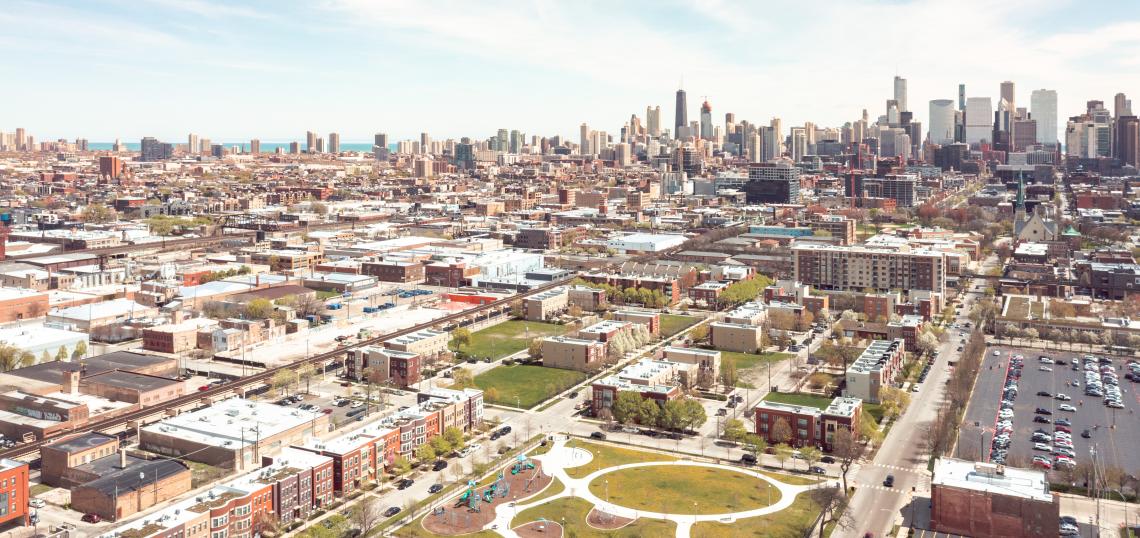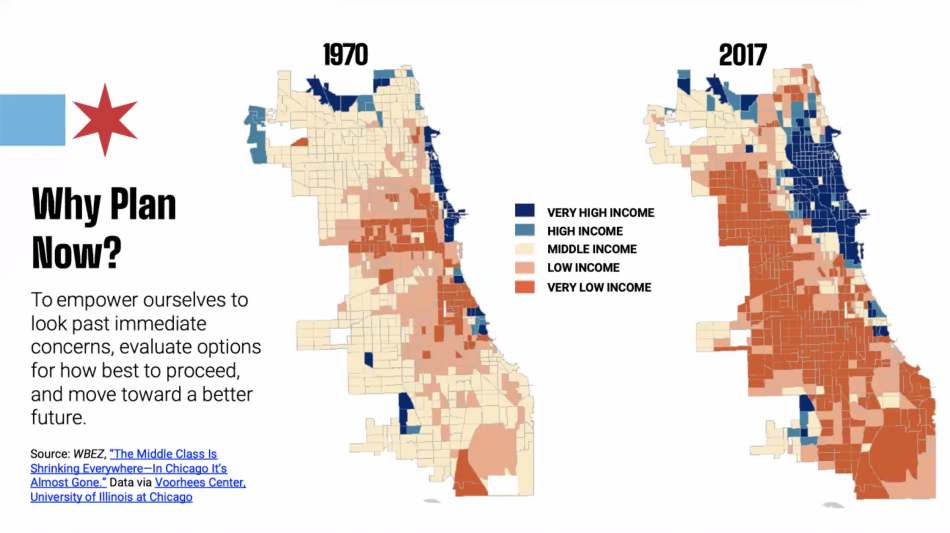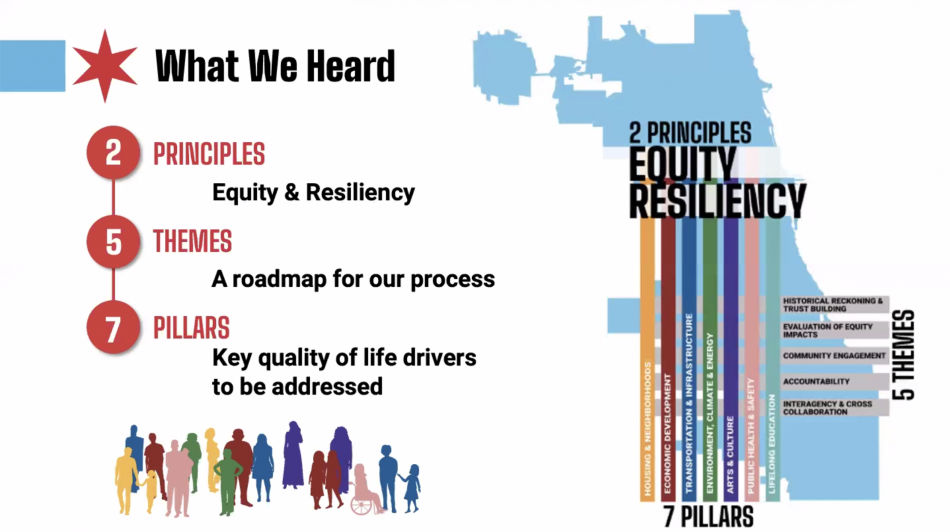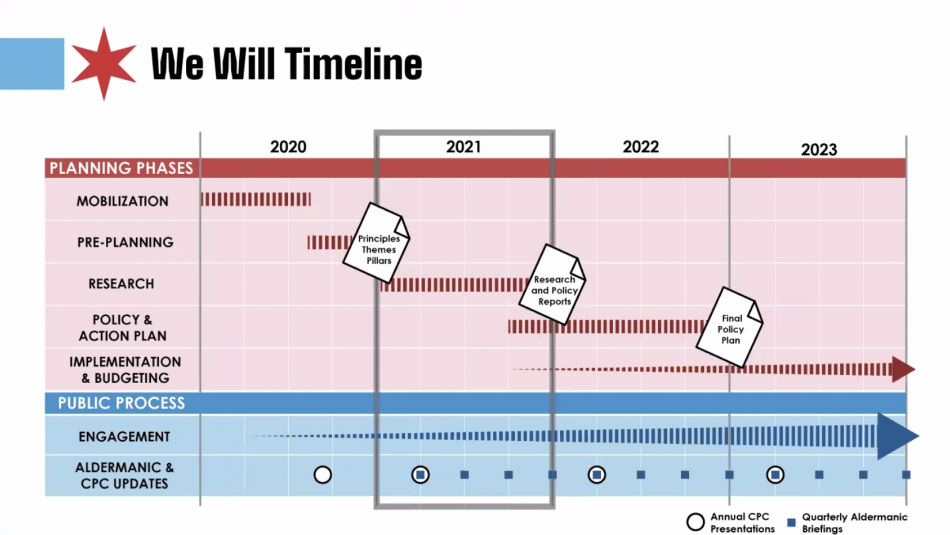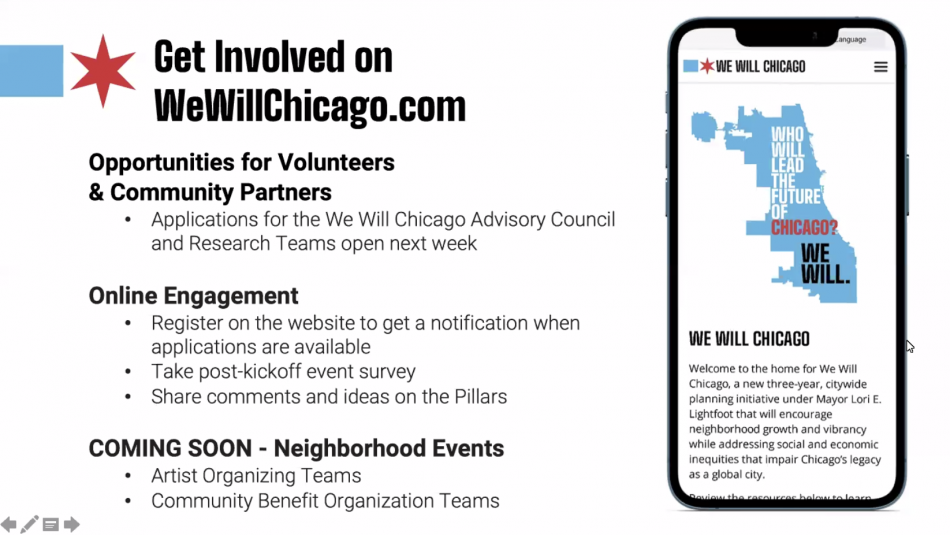On Thursday, city officials and planners provided an update on their work to draft a citywide planning initiative known as We Will Chicago. Launched in August, the three-year process is a top priority of Mayor Lori Lightfoot and represents Chicago's first citywide planning document since the 1966 Comprehensive Plan created under Mayor Richard J. Daley.
"One of the things that I've heard both on the campaign and during my time as mayor is a yearning for a better sense of land use," said Lightfoot at Thursday's virtual kick-off presentation. "We want how and when and under what circumstances land is developed to be determined through data, public engagement, and a thoughtful process and not just being dictated through the vagaries of developers," said the mayor.
"With due respect to the development community, we can do better than what we've done—particularly over the past few years where we've been hard-pressed to see meaningful efforts south of Roosevelt Road and west of Ashland."
Although Chicago officials have implemented a number of neighborhood-specific plans over the years, We Will aims to bring those efforts together in a holistic approach to how the city grows in the future and addresses its current shortcomings.
So why does Chicago need a plan on a citywide level, and why now? To answer those very basic questions, Department of Planning and Development Commissioner Maurice Cox presented a pair of side-by-side maps showing the shift in income distribution across the city from 1970 to 2017. The diagram illustrated a major redistribution of community wealth from the south, southwest, and west sides to a select set of neighborhoods located near downtown and on the north side.
"These two maps encapsulate the overarching issues that have occurred in Chicago since the last time we did a plan, which was in the 1960s," said Commissioner Cox. "I think the beauty of planning is that the same policies that created this map can redraw this map. I believe it's our generation that is being called to leave the next generation a policy guide that addresses the two issues of our time: equity and resiliency."
Cox explained that equity is "essential to addressing the structural racism, depopulation, poverty, and health disparities that we know all too well exist in our city." The resiliency aspect of the plan is about helping Chicagoans survive, adapt, and overcome crises such as illness and job loss. "It also speaks to the more essential threats of climate change and pandemics," said Cox.
The commissioner explained that unified citywide plans are commonplace in other large U.S. cities like New York, Los Angeles, and Boston, and that those cities update their plans often. Cox noted that those cities are gaining population while Chicago continues to see its numbers decline.
Since the We Will initiative was announced last summer, Cox says the planning department has talked with hundreds of residents in neighborhoods across the city to learn about their priorities. The conversations informed the principles and themes that will give the We Will plan its final form.
Thursday's meeting was light on specific policies and practices (those will come later this year or early next). Instead, the focus up to this point has been identifying the issues that exist now and the areas where such a plan can make the biggest impact.
According to the presentation, We Will will be steered by five guiding themes to address the issues of equity and resilience: historical reckoning & rebuilding trust, evaluation of equity impacts, community engagement, accountability, and interagency collaboration.
The plan will foster policies that form seven "pillars" including arts and culture; economic development; environment, climate, and energy; neighborhood housing; lifelong education; public health and safety: transportation and infrastructure.
"In a city with an economy the size of Switzerland, we can't afford to be segmented by race and by class," Cox said. "Opportunity has to be pervasive throughout the city and I think this plan, if we do this right, will leave a roadmap for the next generation, well beyond any mayoral term."
Planners expect to present We Will for review and adoption by the Chicago Plan Commission and City Council in late 2022 and then move to the implementation phase. Once ratified, the document has the potential to reshape the next 30 years of urban planning and development in Chicago.
In the meantime, residents are encouraged to share their thoughts and get involved with the plan through volunteering or community partnerships in the coming weeks.
"I never thought I would be so excited to talk about a city plan," added Helene Gayle, the head of The Chicago Community Trust. "Economic inequity is at the root of our region's most significant challenges from a stagnant economy, to public safety, to health, to family wellbeing," said Gayle. "Investing in the communities that have been left out and left behind will benefit all of us."
We Will represents an ongoing collaboration between the Chicago Department of Planning and Development (DPD), the Department of Cultural Affairs and Special Events (DCASE), the Chicago Metropolitan Agency for Planning (CMAP), the Metropolitan Planning Council (MPC), and Mayor Lightfoot's Office of Equity and Racial Justice (OERJ).




